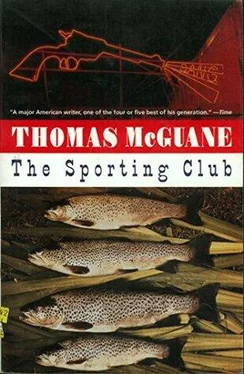“Why don’t we get out of here?” Janey asked. The two men stared at her with disapproval. Stanton asked if she was complaining about the food and she told him that he wasn’t funny. He reminded her that it was free and nourishing too. Quinn asked, “Anybody want any more — what is this? — pâté?”
“Please.” She hid her face, then uncovered it quite suddenly to say angrily, “I’m scared!” Quinn was unconvinced by this and wondered for the first time if she was in it too.
The floor was littered with sandwich wrappers and Stanton had thrown food. Ice cubes stood in small pools of melted water on the rubber aisle mat. Through the tinted windows of the Greyhound, Quinn could see lake gulls wheeling and screaming. He looked again toward the audience where G. Mennen Williams of the soap industry had replaced the French Canadian. The governor stood at the podium, his head turned to his predecessor. The Frenchman’s eyes were directed toward the governor’s bow tie, admiring its spotted surface. The governor looked at the Frenchman’s hairline. All the mouths of the audience opened and closed in cries of spasmodic, unhearable laughter. The governor allowed himself a grin. Behind the podium the cars of the queens were parked in a semicircle and all of the queens huddled together for warmth and opened their mouths to laugh as the others did.
“Please please please.”
“All right, can it!”
“For someone who was in the army such a short time,” she said miserably, “you picked up so many of the expressions.”
“Quinn, we live in a world wracked with strife.”
“They’re starting to move!” Janey cried.
“They’ve stopped again,” said Quinn, making a grandstand play. Janey looked at him with surprise and disappointment. Before she could say anything, and Quinn dreaded what it would be, two women in wind-damaged picture hats stepped onto the front of the bus. Quinn thought this must be the end.
“We’re not ready for you yet, ladies!” Stanton called; any reservations Quinn had fell away, and the admiration flooded in. When he glimpsed Janey, he saw that her eyes too reflected an unexpected pleasure. The two women retreated, Quinn supposed for reinforcements; they didn’t look as if they had been taken in. Stanton, meanwhile, was talking about a plan he had for raising a Mormon shipwreck off Beaver Island. But Quinn allowed his eyes to fasten upon the door in a point-sacrificing manner; therefore, he was the first to descry the entrance of three gentlemen of the order of Shriners. They all three wore the headgear of their fraternity, the fez. Stout gentlemen, they suggested that Shriner life suited them to a T. Visible behind them were the two women who had appeared earlier.
“Say!” said the first of the gentlemen in the fezzes. His face had gone beef red at the sight of the three and the untidiness which they had created.
“Out out out,” said Stanton, hurrying the first gentleman, and in turn the others, by pushing his chest. “Not another word if you’re going to thrust yourselves in here like that. Not one more word. ” He pushed them out the door, shut it with a rubbery clatter and returned.
Quinn was awestruck. He wanted Stanton’s signature on his infielder’s mitt. Stanton went on about his shipwreck. He said it was a small steamer and was carrying a printing press. A multitude looked in the windows of the bus. “Shall I open another box lunch?” Quinn asked, trying to regain his self-respect in the face of Stanton’s tour de force. But he saw only the commonplaceness of his suggestion reflected in Stanton’s eyes.
“I’m full, thank you,” Stanton said. Quinn was ashamed of himself. He should have refused to play; but now that he was, he was ashamed for playing so poorly. How could he become a tycoon and a savant or even tell people what to do when he behaved like this? People were pounding on the windows. “Let’s get the show on the road,” Stanton said and walked forward to the door. The three gentlemen of the fraternal order were standing just outside. They had been joined by the lieutenant-governor and by the smoked pickerel queen who had lost her elusive prettiness in indignation. Stanton opened the door and looked upon them like a censorious bishop. “What is it?” He had become this bishop. “Yes?”
“Look, you!” It was the first Shriner once more, his fez drolly askew.
“Do you have tickets?” Stanton asked. He was stern with these people.
A roar: “Tickets!”
Stanton closed the door and latched it. Quinn could feel nothing around him. He floated in his seat. Stanton pulled down the microphone and held its button. His voice was loud outside as he spoke. “Regular bus service begins—” here he consulted his watch “—in about thirteen months. Now I know that’s a long wait and I would like to suggest to those of you who didn’t bring just an awful lot of camping equipment that you spend the interim building shelters of a simple, utilitarian kind and gathering essential foodstuffs.” He released the button, replaced the microphone and drove away. When the shouting of the canaille died behind, there was only Quinn’s helpless, rueful applause.
Stanton hired an off-duty patrolman to deliver the bus to the Otsego County grange hall for their annual VFW picnic. The officer hesitated until Stanton hinted that there would be something in it for him at the other end. “Keep money in front of these bozos if you want action.” They went to the boat where Stanton popped the tarp off its grommets and gathered it in his arms to stow belowdecks. Quinn lent a hand, trying to size up Stanton’s intentions. Stanton opened the hatches and ran the ventilation blowers before starting the engines. They cast off, reversed out of the slip and moved toward the bridge steadily. When they drew under it, Stanton shifted the engines into neutral and got out the glasses. Directly above them, the crowd they had just left straggled south toward Mackinac City. “We bitched them good,” said Stanton, pushing the outermost levers forward. The yacht began to move again on the brilliant chop. Stanton pulled up the hinged seat in front of the controls, fixed its support rod and sat down. Quinn leaned against the shelf under the windshield, seeing over the front of the boat the flat breaking of water at the bows. The deck tapered forward with its narrow consecutive planks of holystoned teak; and on this surface, like some sculptural display, were the polished horns and big knuckled-over searchlights.
“Janey isn’t fond of boats, are you?”
“Not very.”
“And since she is a social do-gooder, she figures it’s childish to have such expensive playthings. Is that accurate?”
“Pretty much.”
“I once recommended Janey to Clara Barton, founder of the Red Cross Rescue Relief. I said here is a girl who can rescue and relieve. James, old sport, I’ve had the boredom around my neck more than once and I haven’t been ashamed to scream. I screamed like a Bedouin. What’s the matter with me, Mr. Quinn. I have what men dream of. I’m free, white and twenty-one with sixty zillion dollars billowing in a green cloud out of my asshole and I am obliged to scream like a Bedouin. Explain that to me, Cedric, and I’ll buy you a new Slazenger.”
“I can’t explain.”
“It comes up around my throat like a cold ring and I find I am a pagan with less energy than an odalisque and there is no God. Why?” Quinn thought of the tooth that had floated out of his tongue.
“I don’t know. I can’t explain it.”
“If God will show himself, I will buy him a new Slazenger.” They drove leisurely in the boat that rolled along at the cost of fifty-six gallons an hour. Stanton continued to introduce the usual topics: the Dreyfus Affair, the Papist conspiracy in America, the eruptions of Popocatepetl, Shakespeare, the Monomoy Indians, freeze-dried food, jai alai. Suddenly he shook Quinn’s hand. “Help me,” he said, “I need your help. No tips, please. Women will not wear shorts or halters in town. I need your assistance.”
Читать дальше












